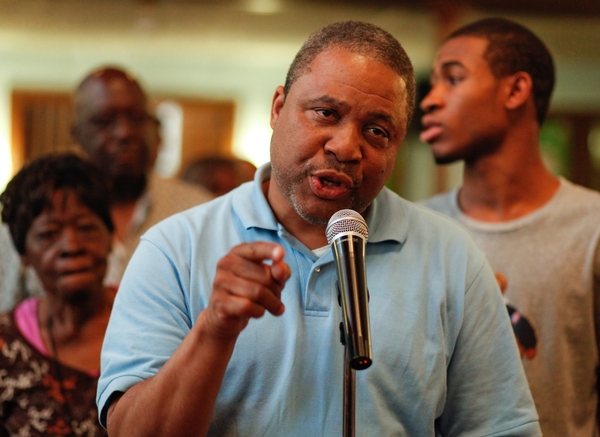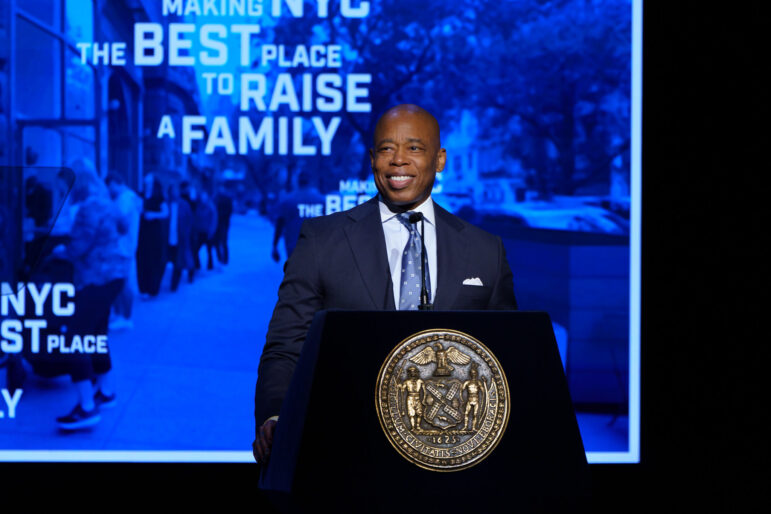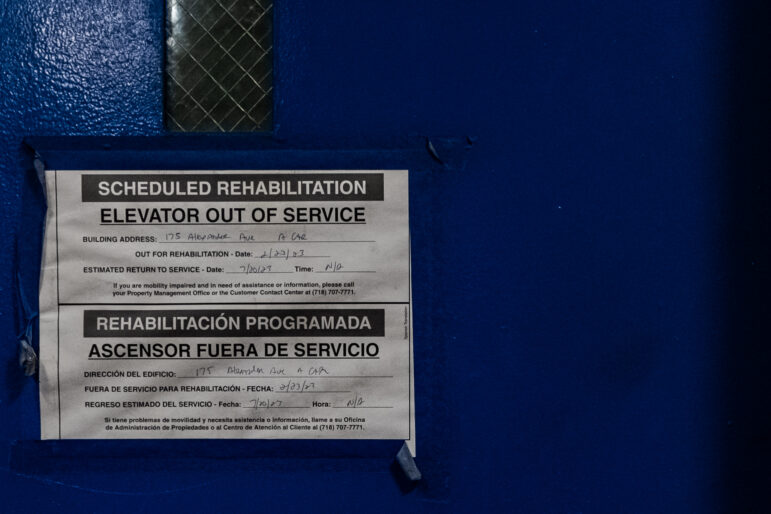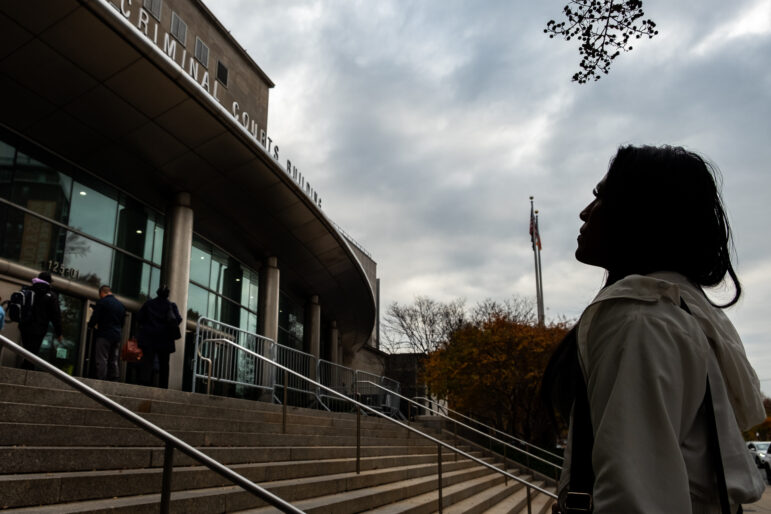
Photo by: Marc Fader
David Miller speaks about the many times his son Daniel, right, has been stopped by the police.
This story has been updated.
Anger rattled his voice when he came to the microphone to tell a tale that has become all too familiar in his Brooklyn neighborhood, Bedford-Stuyvesant. The police have been harassing him, he told the crowd, because he is a young, black male. In his hand, he held a baseball cap. His hair was cropped close to his head. He wore a long, white t-shirt and oversized jeans. He’s done nothing wrong, he said, but police have issued him 50 tickets he can’t afford to pay, accusing him of loitering, engaging in disorderly conduct and other minor crimes. “I’ve got fifty tickets in my house and I ain’t got fifty dollars,” he said.
The man was one of about 150 people who showed up at a town hall meeting in Bed-Stuy Wednesday evening to vent their frustrations with the New York City Police Department, in the aftermath of the police scandal that recently surfaced in their precinct.
In May, Village Voice reporter Graham Rayman broke the story that Steven Mauriello, the then-commanding officer of Precinct 81, had ordered the officers beneath him to fulfill “stop-and-frisk” and arrest quotas, and to ignore some reports in order to keep crime rates down. Between June of 2008 and October of 2009, Adrian Schoolcraft—a Precinct 81 officer who found these practices questionable—created a series of audio recordings that exposed Mauriello’s endorsement of these practices and handed them over to the Voice.
Over the July 4th weekend, Mauriello was transferred to a precinct in the Bronx. Juanita Holmes, an African-American woman replaced him.
At the town hall meeting, she said she is about “courtesy, professionalism, and respect.” She said she has a “strong open door policy” and needs the help of the community to address the problems in the precinct. “I work for you,” she said.
But town hall attendees said the problems in their precinct still exist. Some said they don’t trust the remaining officers there or anywhere else in the city. A woman said that she “would never call the police for any reason—if I was assaulted,” she said, “they would be the last people I would call.”
Throughout the two-and-a-half-hour meeting, 24 people came to the microphone to explain the reasons for their distrust.
An older woman, a grandmother, said that she was beaten by police officers in 2008 when she could not produce identification. Both of her wrists were broken during the incident, she said..
David Miller, who directs a hip hop TV show, said that his son was arrested on the streets of Bed-Stuy for lack of identification and was sent to central booking for 22 hours. “It’s like the South Africa pass laws,” he said. “We are simply not respected.”
Attendees noted that Mauriello’s transfer also doesn’t address the community’s concerns about the police department’s collection of the names, addresses, and phone numbers of every individual who has been subject to stop-and-frisks or issued a ticket—even those who’ve been exonerated of the charges against them. According to Assemblyman Hakeem Jeffries, who attended the meeting Wednesday, 90 percent of those whose names are in the database have not committed a crime.
Governor Paterson signed into law Friday morning a bill that would prevent police from retaining some of the information collected during their stops, despite the reported opposition of. But police Commissioner Raymond Kelly.
“There seems to be an appetite to consume as much information about black and Latino young men [as possible],” Assemblyman Jeffries said on Wednesday.
“The governor’s signature on this bill should serve as a wakeup call to the mayor, the Police Department and all of New York’s elected officials: We have work to do,” said the New York Civil Liberties Union’s Associate Legal Director Christopher Dunn, in a press release. “The NYPD must not continue its campaign of excessive and racially lopsided policing. The database legislation is just the start of what we must accomplish.”
Despite attendees’ frustration with the police, Rev. Conrad Tillard – senior pastor of Nazarene Congregational United Church of Christ, the church that hosted the town hall meeting – emphasized the importance of unity with officers. “We want to work with the law enforcement establishment. All we want them to do is be fair,” he said. “We want them to protect and serve and respect the rights of the citizens—not only of this community but of all communities.”









